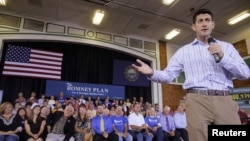The U.S. presidential race has had an all-consuming focus on the economy, at least until now. While economic matters continue to dominate, international affairs have forced their way into the nation’s political discourse less than six weeks before the election.
The campaigns of President Barack Obama and his Republican challenger, Mitt Romney, are exchanging sharp words on recent events in Libya and other foreign policy challenges, as the candidates themselves prepare for their first debate later this week.
Sunday, former Governor Mitt Romney’s vice presidential pick, Congressman Paul Ryan, slammed the Obama administration’s handling of a deadly attack on the U.S. consulate in Benghazi, Libya.
“Their response was slow. It was confused, it was inconsistent. They first said it was a YouTube video [that sparked the violence] and a spontaneous mob [that attacked the consulate]. We now know that it was a planned terrorist attack.”
Ryan spoke on the U.S. television program Fox News Sunday. He said the Benghazi attack is symptomatic of a failed American foreign policy under President Obama.
“We are seeing the ugly fruits of the Obama foreign policy unravel around the world on our television screens. In Syria, 20,000 dead people. Iran is closer to a nuclear weapon. The Middle East peace process is in shambles, and we have our flags being burned all around the world. This is a weak foreign policy with terrible results, which makes us less safe.”
Pushing back against such criticism, White House senior adviser David Plouffe says there is no mystery to the administration’s changing descriptions of the Libya attack.
“There has been an ongoing investigation. And this is an event of great interest to the news media and the public, understandably. So there has been information provided real-time [moment-by-moment]. Obviously, you are going to know more about an event a week after it happens.”
Appearing on ABC’s This Week program, Plouffe defended President Obama’s handling of world affairs.
“This president promised a few things in 2008. He would end the Iraq war, he did. He would take the fight to al-Qaida and degrade them, he has. He would focus on [Osama] bin Laden and bring him to justice, we did. Governor Romney called ending the Iraq war tragic. And he said famously in 2008 [that] he would not have gone into Pakistan to get bin Laden."
Public-opinion polls show American voters overwhelmingly concerned with economic matters, but generally giving higher marks to President Obama on foreign policy questions than Governor Romney. The first presidential debate Wednesday will focus on the economy, with a later debate dedicated to foreign affairs.
The campaigns of President Barack Obama and his Republican challenger, Mitt Romney, are exchanging sharp words on recent events in Libya and other foreign policy challenges, as the candidates themselves prepare for their first debate later this week.
Sunday, former Governor Mitt Romney’s vice presidential pick, Congressman Paul Ryan, slammed the Obama administration’s handling of a deadly attack on the U.S. consulate in Benghazi, Libya.
“Their response was slow. It was confused, it was inconsistent. They first said it was a YouTube video [that sparked the violence] and a spontaneous mob [that attacked the consulate]. We now know that it was a planned terrorist attack.”
Ryan spoke on the U.S. television program Fox News Sunday. He said the Benghazi attack is symptomatic of a failed American foreign policy under President Obama.
“We are seeing the ugly fruits of the Obama foreign policy unravel around the world on our television screens. In Syria, 20,000 dead people. Iran is closer to a nuclear weapon. The Middle East peace process is in shambles, and we have our flags being burned all around the world. This is a weak foreign policy with terrible results, which makes us less safe.”
Pushing back against such criticism, White House senior adviser David Plouffe says there is no mystery to the administration’s changing descriptions of the Libya attack.
“There has been an ongoing investigation. And this is an event of great interest to the news media and the public, understandably. So there has been information provided real-time [moment-by-moment]. Obviously, you are going to know more about an event a week after it happens.”
Appearing on ABC’s This Week program, Plouffe defended President Obama’s handling of world affairs.
“This president promised a few things in 2008. He would end the Iraq war, he did. He would take the fight to al-Qaida and degrade them, he has. He would focus on [Osama] bin Laden and bring him to justice, we did. Governor Romney called ending the Iraq war tragic. And he said famously in 2008 [that] he would not have gone into Pakistan to get bin Laden."
Public-opinion polls show American voters overwhelmingly concerned with economic matters, but generally giving higher marks to President Obama on foreign policy questions than Governor Romney. The first presidential debate Wednesday will focus on the economy, with a later debate dedicated to foreign affairs.








